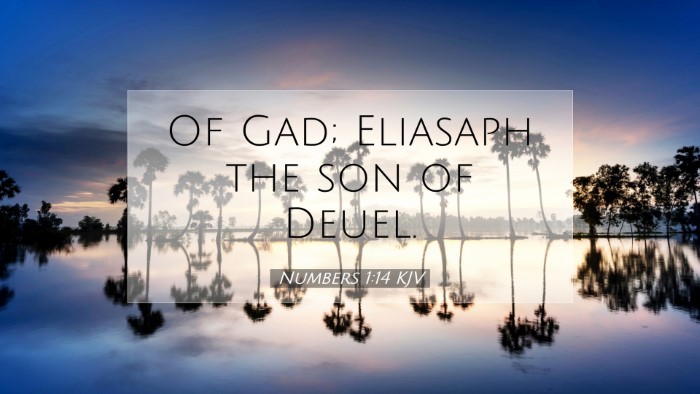Commentary on Numbers 1:14
Verse Reference: Numbers 1:14 - "Of the tribe of Gad; Eliasaph the son of Deuel."
Contextual Background
In this chapter, the Lord commands Moses to take a census of the Israelites in the wilderness. This count serves multiple purposes: to organize the people for military and logistical needs, to allocate resources, and to affirm God’s promise of a great nation. Numbers 1:14 introduces a significant leader from the tribe of Gad, a pivotal moment reflecting God's order amid the preparation for entering the Promised Land.
Insights from Commentaries
Matthew Henry's Commentary
Matthew Henry emphasizes the importance of the leaders in this enumeration, viewing the appointment of Eliasaph as more than administrative; it signifies God's sovereignty in choosing His servants. He notes that Gad was one of the sons of Jacob and points out that the tribe allotted to Gad was known for their military prowess, ready for the battles ahead. Henry reflects on the significance of tribal identities and the role they play in the larger narrative of Israel’s history.
Albert Barnes' Notes on the Bible
Barnes points out the leadership qualities embodied by Eliasaph. His name suggests “God has added,” which carries a theological depth, implying that God exceeds expectations and provisions. Barnes elaborates on the tribe of Gad, identifying them as fierce warriors, which showcases the diversity of gifts within Israel. Moreover, he highlights the necessity of preparing leaders who not only possess strength in battle but also spiritual discernment for the challenges ahead.
Adam Clarke's Commentary
Adam Clarke draws attention to the genealogical aspect of this verse, clarifying the lineage of Eliasaph and its significance. He conveys that knowing the family connections within the tribes reinforces the historical identity and spiritual heritage of the Israelites. Clarke also examines the name "Deuel," which translates to “God is my friend,” underscoring the close relationship between divine favor and leadership. Clarke insists that this underscores the character of leaders being anchored in their relationship with God.
Theological Implications
This verse also invokes themes of divine order, leadership within the community, and God's providential guidance. Understanding the roles of leaders like Eliasaph sheds light on the underlying principles of leadership that are both biblically based and applicable in contemporary ministry. God's selection of leaders according to His purpose serves as a reminder to current leaders of their calling and the necessity of being aligned with God's will.
Practical Applications
- Leadership: Modern church leaders can learn from Eliasaph’s example—being appointed for specific tasks by divine appointment. This calls for recognizing God's hand in our leadership roles.
- Identity: Just as the tribes of Israel were identified by their lineage, church communities today are called to embrace their identity in Christ while honoring their unique backgrounds.
- Spiritual Warfare: The readiness of the tribe of Gad serves as a metaphor for spiritual preparedness in modern Christianity. Leaders must cultivate a warrior spirit in the face of spiritual challenges.
- Connection to Tradition: Understanding their ancestry helps congregations connect with their spiritual heritage and maintain continuity in faith practices.
Conclusion
Numbers 1:14 offers much for reflection, including God's meticulous care in appointing leaders who will guide His people. The insights drawn from these public domain commentaries invite pastors, students, and theologians to explore the deeper meanings behind this brief verse, enhancing their understanding of biblical leadership and community formation.


